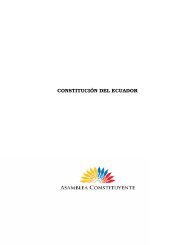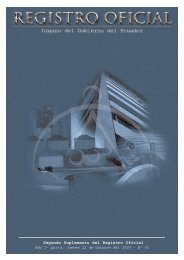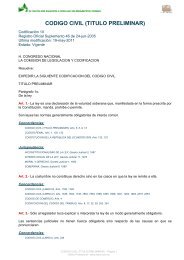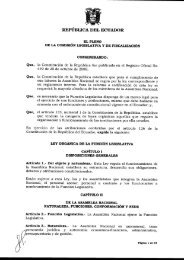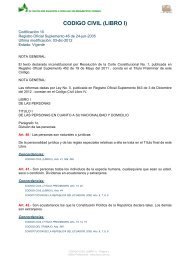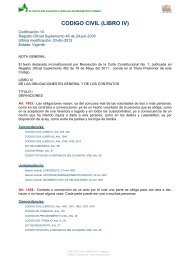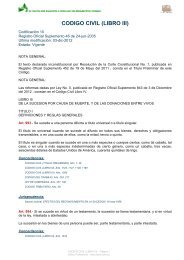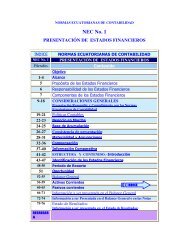CODIGO CIVIL (LIBRO II)
Create successful ePaper yourself
Turn your PDF publications into a flip-book with our unique Google optimized e-Paper software.
<strong>CODIGO</strong> <strong>CIVIL</strong> (<strong>LIBRO</strong> <strong>II</strong>), Arts. 713, 861, 863, 928, 961<br />
<strong>CODIGO</strong> <strong>CIVIL</strong> (<strong>LIBRO</strong> IV), Arts. 2398, 2399, 2408, 2412<br />
Jurisprudencia:<br />
Gaceta Judicial, CONSTITUCION DE SERVIDUMBRES, 11-dic-1871<br />
Gaceta Judicial, ADQUISICION DE SERVIDUMBRES, 22-jun-1899<br />
Gaceta Judicial, SERVIDUMBRE DE TRANSITO, 10-nov-1983<br />
Art. 927.- El título constitutivo de servidumbre puede suplirse por el reconocimiento expreso del<br />
dueño del predio sirviente.<br />
La destinación anterior, según el Art. 925, puede también servir de título.<br />
Concordancias:<br />
<strong>CODIGO</strong> <strong>CIVIL</strong> (<strong>LIBRO</strong> <strong>II</strong>), Arts. 925, 965<br />
<strong>CODIGO</strong> <strong>CIVIL</strong> (<strong>LIBRO</strong> IV), Arts. 2399<br />
Art. 928.- El título, o la posesión de la servidumbre por el tiempo señalado en el Art. 926, determinan<br />
los derechos del predio dominante y las obligaciones del predio sirviente.<br />
Concordancias:<br />
<strong>CODIGO</strong> <strong>CIVIL</strong> (<strong>LIBRO</strong> <strong>II</strong>), Arts. 926, 965<br />
<strong>CODIGO</strong> <strong>CIVIL</strong> (<strong>LIBRO</strong> IV), Arts. 2399<br />
Parágrafo 4o.<br />
De la extinción de las servidumbres<br />
Art. 929.- Las servidumbres se extinguen:<br />
1. Por la resolución del derecho del que las ha constituido;<br />
2. Por la llegada del día o el cumplimiento de la condición, si se ha establecido de uno de estos<br />
modos;<br />
3. Por la confusión, o sea la reunión perfecta e irrevocable de ambos predios en manos de un mismo<br />
dueño. Así, cuando el dueño de uno de ellos compra el otro, perece la servidumbre; y si por una<br />
nueva venta se separan, no revive, salvo el caso del Art. 925. Por el contrario, si la sociedad<br />
conyugal adquiere una heredad que debe servidumbre a otra heredad de uno de los dos cónyuges,<br />
no habrá confusión sino cuando, disuelta la sociedad, se adjudiquen ambas heredades a una misma<br />
persona;<br />
4. Por la renuncia del dueño del predio dominante; y,<br />
5. Por haberse dejado de gozar diez años.<br />
En las servidumbres discontinuas corre el tiempo desde que han dejado de gozarse; en las<br />
continuas, desde que se haya ejecutado un acto contrario a la servidumbre.<br />
Concordancias:<br />
<strong>CODIGO</strong> <strong>CIVIL</strong> (<strong>LIBRO</strong> <strong>II</strong>), Arts. 816, 861, 925, 934<br />
<strong>CODIGO</strong> <strong>CIVIL</strong> (<strong>LIBRO</strong> IV), Arts. 1681, 2414, 2415<br />
LEY DE AGUAS, Arts. 71, 72<br />
Art. 930.- Si el predio dominante pertenece a muchos, proindiviso, el goce de uno de ellos<br />
<strong>CODIGO</strong> <strong>CIVIL</strong> (<strong>LIBRO</strong> <strong>II</strong>) - Página 79<br />
eSilec Profesional - www.lexis.com.ec




